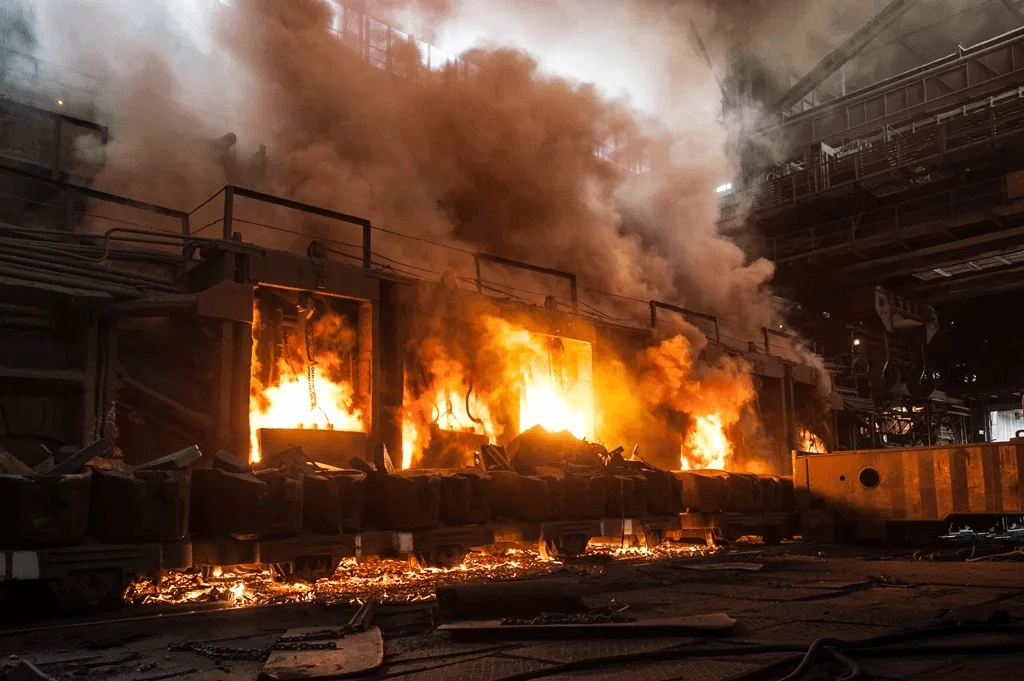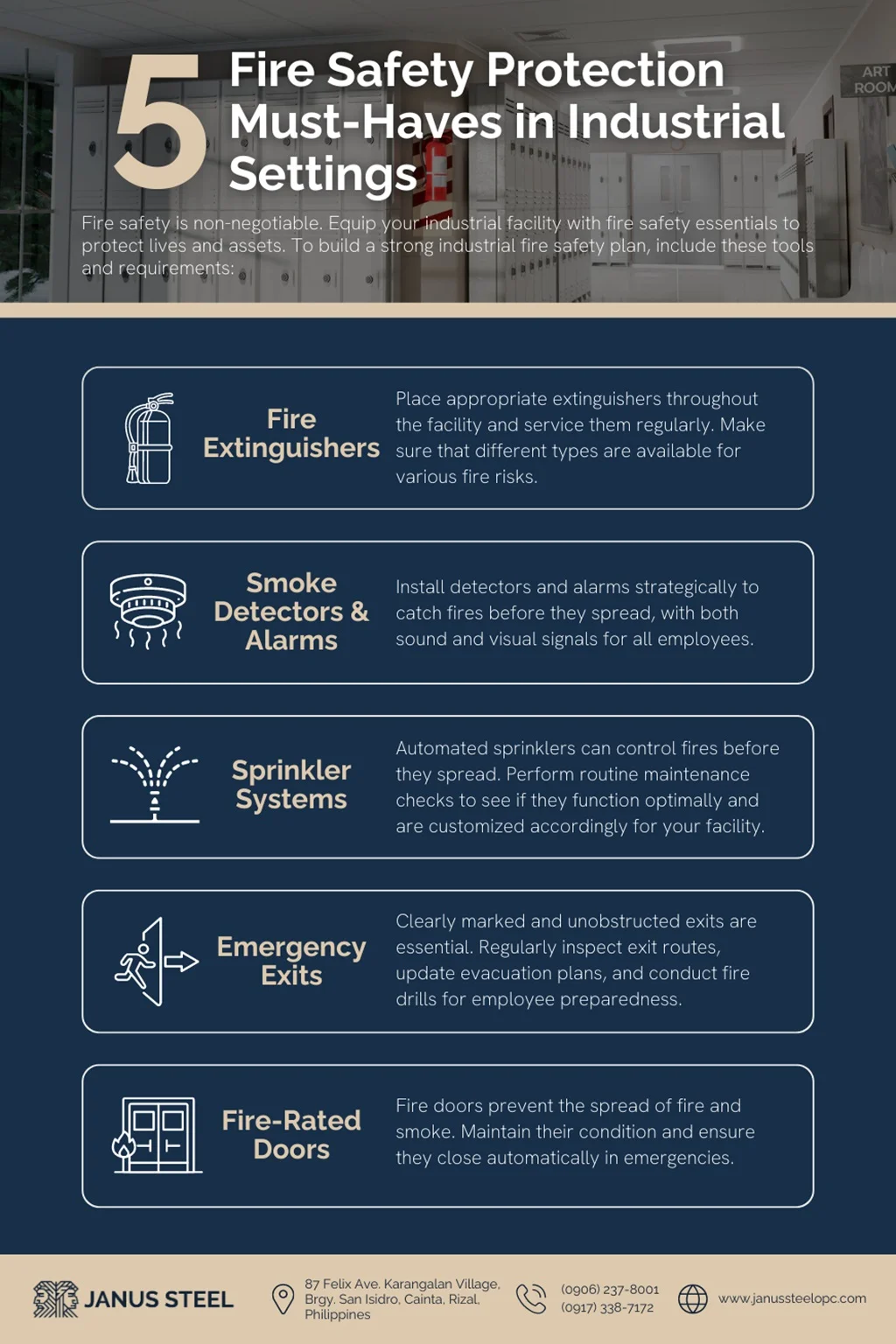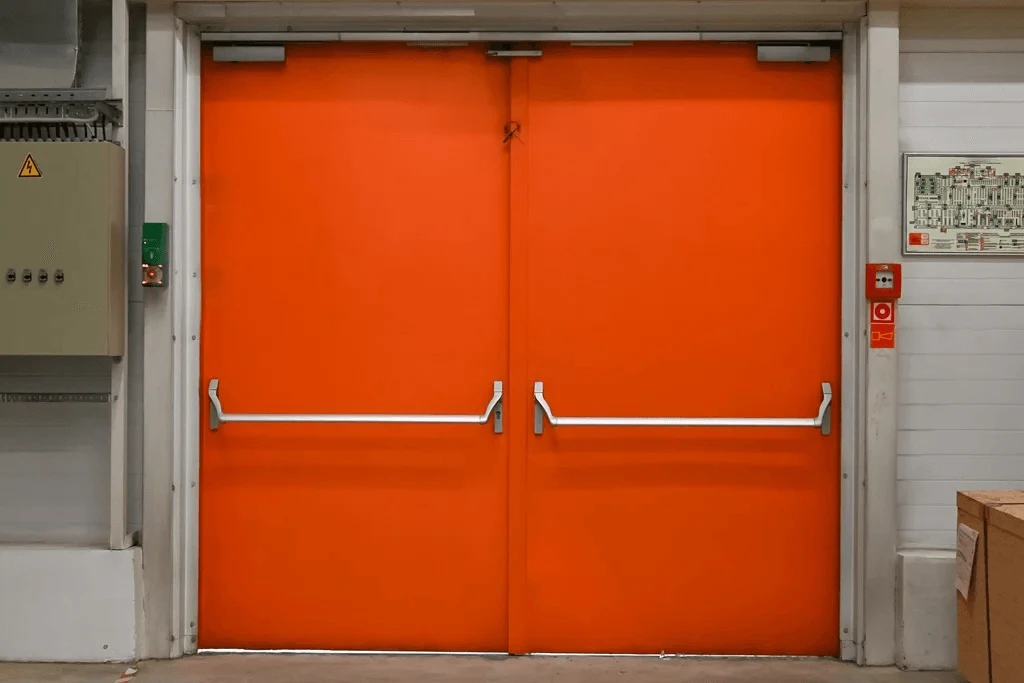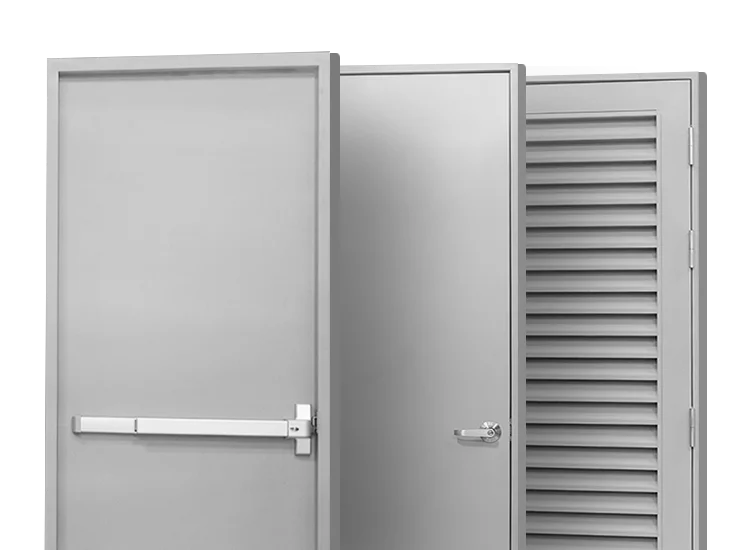Fire safety in industrial settings is a pressing concern that demands attention. With risks ranging from electrical malfunctions to the presence of highly flammable materials, it’s essential to implement comprehensive safety strategies.
In this post, we’ll explore key industrial fire safety measures, equipment, best practices, and the role of fire-rated doors in ensuring maximum protection for your facility and workers. Read on!
Why Does Fire Safety in the Industrial Workplace Matter?
Fire safety in the industrial workplace is very important. Industrial environments are often filled with flammable materials, heavy machinery, and complex electrical systems, making them particularly vulnerable to fires. Enforcing robust fire safety measures ensures the protection of valuable assets and people’s lives, while preventing severe financial losses.
Investing in industrial fire safety also contributes to the overall well-being and productivity of the workforce, fostering a safer and more secure environment for everyone.
Top Causes of Industrial Fires
Industrial fires pose significant risks, often resulting in catastrophic consequences for facilities, employees, and the surrounding community. To safeguard your workplace, it is essential to identify and understand the primary causes of these incidents. Start by enacting effective measures to prevent fires and ensure a safer working environment.
Here are some common factors that frequently contribute to industrial fires that every business should be aware of:
Electrical Faults
Electrical faults are one of the leading causes of industrial fires, often originating from overloaded circuits and faulty wiring. When circuits are overloaded, the excessive current generates heat, potentially igniting surrounding materials.
Similarly, outdated, frayed, or improperly installed wiring can spark and lead to fires. That is why regular maintenance and implementing safeguards like circuit breakers and surge protectors provide an additional layer of protection.
Flammable Materials
In industrial settings, flammable materials like chemicals and solvents pose considerable fire risks. This is why they require careful handling and strict storage guidelines to prevent accidental ignition. Proper labeling and storage areas can help manage these hazards and reduce the likelihood of fires.
It’s also imperative to equip workplaces with fire suppression systems designed for flammable materials while training employees in safe handling and emergency response protocols.
Human Error
Human error is another major cause of industrial fires, often resulting from negligence or improper equipment use. Simple mistakes, like placing combustible materials near heat sources or mishandling flammable substances, usually result in severe fires. To address this, comprehensive training should be mandatory to educate staff on fire safety practices. Moreover, regular drills and safety meetings can keep fire safety a priority for everyone.
Mechanical Failure
Mechanical failures frequently result from overheating or inadequate maintenance, leading to fires. Friction or malfunctioning parts may generate sparks or excessive heat. Installing temperature monitors and automatic shutoff systems can help detect overheating early. Keeping machinery areas clear of flammable debris also reduces fire hazards.

Key Industrial Fire Safety Tips and Strategies
In addition to understanding the leading causes of fires in industrial settings, it’s equally crucial to enforce proactive fire prevention strategies. These measures ensure that your space remains secure and resilient against fire risks. If you’re not yet familiar with these steps, here are some key tips to help safeguard both your assets and employees from potential fire hazards.
Make sure all equipment and electrical systems are regularly maintained and inspected for faults.
Routine checks help identify potential fire hazards before they become severe issues. Schedule maintenance during periods of low activity to minimize interruptions. Keeping detailed records of inspections can help track any recurring problems and ensure they are addressed promptly.
Store flammable materials in designated, secure areas.
Use flame-resistant containers and cabinets specifically designed for hazardous substances. Clearly label all storage areas and containers to avoid confusion and accidental mishandling. Additionally, maintaining a clean and organized storage environment helps prevent accidental spills and provides easier access in case of an emergency.
Provide regular fire safety training to employees on safety protocols.
Engage employees with hands-on demonstrations and real-life scenarios to reinforce learning. Encourage open discussions about fire safety so that everyone feels confident in their knowledge and responsibilities. Continually update training materials to keep up with new safety standards and technologies.
Install and maintain fire safety equipment.
Place fire extinguishers at accessible locations and train employees on their proper use. Installing and performing regular tests on alarm systems and sprinklers to ensure they are functional. Keep a log of maintenance and any equipment replacements to eliminate any instance of oversight.

Fire Safety Requirements and Must-Haves in Industrial Settings
Observing compliance with fire safety standards in industrial settings is crucial for protecting both lives and assets. By implementing tailored industrial fire safety measures that address the specific needs of each facility, companies cultivate a culture of safety and preparedness among employees, ultimately enhancing workplace security.
In order to develop a robust industrial fire safety plan, it’s important to incorporate the following essential tools and requirements:
Fire Extinguishers
Accessible and regularly serviced extinguishers should be placed throughout the premises. Different types of extinguishers are required for different classes of fires, so make sure to have the appropriate ones for your specific risks.
Smoke Detectors and Alarms
Functioning smoke detectors and alarm systems are instrumental for early fire detection. Installing detectors in strategic locations increases the likelihood of detecting smoke in its early stages, allowing for swift action. Combining alarms with visual and auditory signals also helps accommodate all employees, including those with disabilities.
Sprinkler Systems
Automatic sprinklers have the capacity to contain and extinguish fires before they spread, significantly reducing damage. It’s important to have them inspected and maintained regularly to ensure optimal performance. Sprinkler systems should be tailored to the specific needs and layout of your facility. Integrating them with other industrial fire safety systems can provide a comprehensive safety network.
Emergency Exits
Clearly marked and unobstructed emergency exits are imperative for safe evacuations. Clear all exit routes from obstructions, while checking all doors if they open easily in the direction of escape. Regularly update evacuation plans and conduct drills so that employees are familiar with the quickest and safest routes. Exit signs should be well-lit and easy to see, even in low-visibility conditions.
Fire-Rated Doors
These doors help prevent the spread of fire and smoke, protecting lives and property. They should be regularly inspected for any damage or wear that could compromise their effectiveness. Ensure that fire doors are not propped open and that they close automatically in the event of a fire. Proper maintenance and staff awareness are keys to maintaining their integrity.
To help you remember these key components, here is an infographic that include a summary or visual representation of the key points here.

Feel free to download the infographic above for future reference.
How Will Fire-Rated Doors Benefit Your Industrial Space?
Fire-rated doors offer vital protection in industrial settings, playing a critical role in industrial fire safety by containing and slowing the spread of fire and smoke. These specially designed doors can spell the difference between minor damage and a catastrophic loss, providing peace of mind that your facility, staff, and assets are safeguarded.
Apart from these, there are other benefits that fire-rated doors offer, including:
Enhanced Safety
Fire-rated doors are engineered to resist fire for a specified period, giving occupants more time to evacuate safely. They help compartmentalize fire-affected areas, preventing flames and smoke from spreading rapidly to other parts of the building. This containment is crucial in industrial environments where flammable materials and heavy machinery can exacerbate a fire’s intensity.
Property Protection
By containing fires to limited areas, fire-rated doors minimize the overall damage to a facility. This containment greatly reduces repair costs and downtime, enabling faster recovery and continuity of business operations. Protecting key areas and equipment from extensive fire damage also safeguards your investments and critical assets.
Insurance Benefits
Many insurance companies offer lower premiums for facilities equipped with advanced fire safety measures, including fire-rated doors. These doors mitigate risks, making your business eligible for cost-effective insurance coverage. Investing in this type of industrial doors thus offers long-term financial savings on insurance costs, alongside the immediate safety advantages.
Peace of Mind
Knowing that your facility is equipped with high-quality, fire-rated doors provides reassurance to both management and employees. This fosters a sense of security, ensuring everyone can focus on their tasks without fearing potential fire hazards. A well-protected work environment also enhances employee morale and productivity, contributing to the overall success of the business.

Ensure Your Space Fire Safety with Janus Steel Fire-Rated Doors
Are you ready to take your industrial fire safety to the next level? Enhance the security and protection of your industrial space with high-quality fire-rated doors from Janus Steel. Our fire-rated doors are designed to meet stringent safety standards, providing you with robust fire protection and peace of mind. Contact us today to learn more about how our fire-rated doors can safeguard your commercial property and employees.






